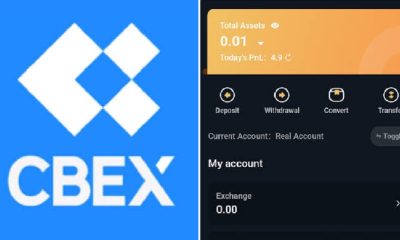Economy
SEE Black Market Dollar To Naira Exchange Rate Today 10 January 2025 Can Be Accessed Below

The official naira black market exchange rate in Nigeria today including the Black Market rates, Bureau De Change (BDC), and CBN rates.
Please note that the exchange rate is subject to hourly fluctuations influenced by the supply and demand of dollars in the market.
As of now, you can purchase 1 dollar at a certain rate now, however, it’s important to remember that the rate can shift (either upwards or downwards) within hours.
What’s the dollar to naira black market today 9 January 2025?
The local currency (abokiFx) opened at ₦1,655.00 per $1 at the parallel market otherwise known as the black market, today, Friday, 10 January 2025, in Lagos Nigeria, after it closed at ₦1,645.00 per $1 on Thursday, 9 January 2025.
Dollar to Naira (USD to NGN) Black Market Exchange Rate Today
Buying Rate ₦1,645
Selling Rate ₦1,655
Please note that Nigeria’s black market dollar-to-naira exchange rate is typically higher than the official exchange rate because the Federal Government does not regulate it. The rates you buy or sell forex may differ from what is captured in this article because prices vary.
What’s the dollar-to-naira CBN exchange rate today?
1 USD = 1547.49 NGN
1 Dollars = 1547.49 Nigerian Naira
The USDNGN rate as of 10 Jan 2025
Economy
Stock Market Surges: N228bn Gain Sets the Tone for a Strong Trading to Week

The Nigerian stock market opened the week on a bullish note on Monday, gaining N228 billion on the Nigerian Exchange Ltd.
Market capitalisation rose by N228 billion or 0.34 per cent and closed at N66.693 trillion compared to Friday’s figure of N66.465 trillion.
Similarly, the All-Share Index (ASI) climbed by 363.57 points or 0.34 per cent, reaching 106,116.18 from 105,752.61 recorded earlier.
The Nigerian stock market opened the week on a bullish note on Monday, gaining N228 billion on the Nigerian Exchange Ltd.
Market capitalisation rose by N228 billion or 0.34 per cent and closed at N66.693 trillion compared to Friday’s figure of N66.465 trillion.
Similarly, the All-Share Index (ASI) climbed by 363.57 points or 0.34 per cent, reaching 106,116.18 from 105,752.61 recorded earlier.
The positive trend was driven by strong buying interest in medium and large-cap stocks including International Breweries, Legend Internet Plc, Cadbury Nigeria, Fidson and more.
In spite of the upward trend, the market breadth closed positively, with 47 gainers and 16 losers.
International Breweries led the gainers’ chart, rising by 10 per cent to close at N8.47 per share.
Legend Internet Plc followed, appreciating by 9.97 per cent to settle at N7.50 per share.
Cadbury Nigeria gained by 9.96 per cent, and end the day at N29.25, while Fidson rose by 9.95 per cent to close at N20.45 per share.
Eterna also advanced by 9.90 per cent to close at N43.85 per share.
On the losers’ chart, Livestock Feeds dropped by 10 per cent, closing at N8.55 per share.
Aradel Holdings declined by 9.86 per cent to end the session at N448.00 per share
Tripple Gee fell by 9.60 per cent to close at N1.79, while John Holt Plc shed 7.94 per cent to close at N5.80 per share.
Linkage Assurance lost by 6.15 per cent, and finished the day at N1.22 per share.
A total of 500.59 million shares worth N12.110 billion were traded in 17,637 transactions.
This is compared to Friday’s 428.08 million shares worth N20.174 billion, exchanged across 14,284 transactions.
Access Corporation led the activity chart with 60.867 million shares traded, which was worth N1.45 billion.
Fidelity Bank followed with 56.105 million shares valued at N1.13 billion while the United Bank for Africa sold 34.53 million shares worth N1.174 billion.
Guarantee Trust Holding Company transacted 33.49 million shares valued at N2.181 billion and the Nigerian Breweries traded 28.336 million shares, amounting to N1.15 billion.
Economy
OPay Scam Alerts advises Nigerians to remain vigilant against dubious activities

You are just seconds away from sending money – the offer sounds perfect, the seller seems trustworthy and the clock is ticking.
But just before you hit send, one of Nigeria’s leading financial institutions, OPay flashes a critical warning: “Caution – this account has been linked to suspicious activity.”
In that moment, the rush fades, your instincts kick in, and you realise you were on the brink of falling for a scam. One smart alert, one timely pause — and your hard-earned money stays exactly where it should: safe.
This is the power behind OPay’s multi-layered scam alert system — an Artificial Intelligence (AI)-driven, real-time defense network designed to detect and stop fraudulent transactions before they happen.
At the heart of it is a machine learning engine trained on thousands of scam patterns, user reports, flagged accounts, and unusual transaction behaviors. But OPay’s approach goes far beyond a single alert.
How OPay’s scam alert ecosystem works
Abnormal Transaction Pop-Up Reminders
When suspicious behavior is detected, OPay immediately interrupts the flow with a clear, targeted pop-up message. Every day, over 60,000 users receive these urgent fraud warnings — and thanks to that, 30,000 risky transactions are stopped in their tracks.
Intelligent Outbound Call Reminders
For higher-risk transactions, OPay activates a multi-channel response, sending warnings via SMS, email, app notifications, and even escalating to customer service calls. This proactive layer reaches more than 10,000 users daily, discouraging over 8,000 fraudulent transactions.
Interactive Q&A Verification
In cases where more context is needed, users are engaged with real-time Question & Answer (Q&A) prompts to understand the purpose of their transaction. If red flags are confirmed, the system presents a tailored warning or ends the transaction flow altogether. This feature alone helps deter over 46,000 scam attempts daily from the 50,000+ users who interact with it.
Together, these layers form a real-time scam detection and prevention engine that evolves with every user interaction. OPay’s system doesn’t just warn — it learns and adapts, constantly improving its accuracy and response time.
Many users don’t even know they’re in danger until OPay steps in. As one X user, @JAHS, shared: “OPay alerted me that I might be sending money to a scammer when I wanted to patronize an IG vendor. Stopped the transaction ASAP.”
These interventions are happening silently, daily – often before the user even suspects something is wrong.
OPay’s scam alert system is part of a broader philosophy: security is not just about technology – it’s about trust. From scam alerts to Face ID transaction verification, USSD instant account locking, the Large Transaction Shield, and automated callback alerts, every tool is designed to protect users in the moments they can’t predict.
As scams get more sophisticated, the future of financial safety depends on real-time prevention. And OPay isn’t waiting for fraud to happen — it’s stopping it in its tracks. Sometimes, the smartest financial decision you make… is the one OPay helped you avoid.
Economy
States face allocation cuts as agency demands N100bn monthly

The monthly statutory allocations to state governments from the federation account may decline in the coming months following an official request by the Nigeria Sovereign Investment Authority to boost the nation’s residual funds with the support of N100bn monthly.
The request, which was presented by the Managing Director and Chief Executive Officer of NSIA, Aminu Umar-Sadiq, is aimed at unlocking large-scale investments to drive Nigeria’s economic growth.
He made the request at the March revenue-sharing meeting of the Federation Account Allocation Committee held between April 14 and 15, 2025. Our correspondent obtained a copy of his presentation during the meeting on Friday.
Umar-Sadiq appealed to the committee, which includes state commissioners of finance, to consider and approve the request, with funding proposed to commence from the March FAAC allocation.
The presentation was titled, “Activating Residual Funding for the Nigeria Sovereign Investment Authority – Unlocking Opportunities for Large-Scale Investments to Drive Nigeria’s Economic Growth.”
According to the document, the NSIA is requesting a structured monthly disbursement of N100bn from Residual Funds—revenues in the Federation Account beyond projected hydrocarbon income—to establish a Naira-based investible capital pool.
The move, the authority says, will enhance its capacity to finance critical domestic infrastructure projects.
The MD said, “The funding would position the authority as a leading sovereign wealth fund globally, promoting responsible and strategic investments for Nigeria’s economic development and enhancing its threefold mandate to build a savings base for the country, enhance the development of infrastructure, and provide stabilisation support.”
He explained that residual funds are a legitimate source of funds transferred to the authority, provided that the derivation portion of the revenue allocation formula shall not be included as part of this funding.
-

 News14 hours ago
News14 hours agoCourt dismisses Emefiele’s bid to reclaim forfeited 753 duplex estate
-

 News5 hours ago
News5 hours agoJust in: Popular Nigerian billionaire, E-Money nabbed by EFCC
-

 Opinion10 hours ago
Opinion10 hours agoTHOUGHTS ON CONSTITUENTS DEVELOPMENT IN OBIO-AKPOR
-

 Metro14 hours ago
Metro14 hours agoWanted CBEX promoter surrenders to EFCC
-

 News6 hours ago
News6 hours agoKing Sunny Ade’s family opens up over his whereabouts after daughter’s alarm
-

 Politics14 hours ago
Politics14 hours agoPDP Calls Emergency Session as Top Members Flee to APC
-

 News7 hours ago
News7 hours agoEx-DIG,Olofu debunks online newspaper report, says ” I retired from NPF meritously after 35yrs service
-

 Entertainment15 hours ago
Entertainment15 hours agoCubana Chief Priest responds following reports of being denied entry at Headies Awards
















